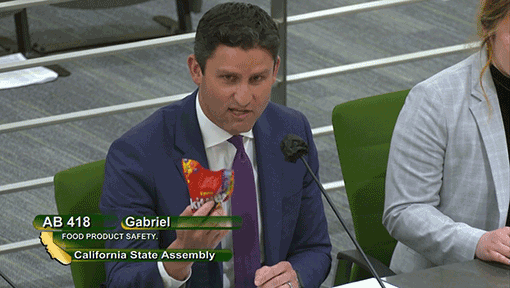SACRAMENTO, CA — The California State Senate passed first-of-its-kind legislation to prohibit the use of four dangerous chemicals in processed foods and drinks sold in California.
Authored by Assemblymember Jesse Gabriel (D-Encino), Assembly Bill (AB) 418 – the California Food Safety Act – would prohibit the manufacture, sale, or distribution in California of any food product containing Red Dye No. 3, Potassium Bromate, Brominated Vegetable Oil, or Propyl Paraben.
The use of these chemicals has already been banned in the 27 nations in the European Union (EU) as well as many other countries due to scientific research linking them to significant health harms, including cancer, reproductive issues, and behavioral and developmental issues in children.
“Today’s bipartisan vote marks a huge step forward in our effort to protect children and families in California from dangerous and toxic chemicals in our food supply,” said Assemblymember Jesse Gabriel. “It’s unacceptable that the U.S. is so far behind the rest of the world when it comes to food safety. This bill will not ban any foods or products – it simply will require food companies to make minor modifications to their recipes and switch to the safer alternative ingredients that they already use in Europe and so many other places around the globe.”
“Things like this aren’t partisan. They’re common sense,” said former Governor and sports and fitness icon Arnold Schwarzenegger, who recently endorsed AB 418 in his daily Pump Club Newsletter. “I’m a small government guy. But I’ve also seen that sometimes, in a world where every big industry has an army of lobbyists, and our kids have no one fighting for them, government has to step in.”
AB 418 was amended in the State Senate to remove titanium dioxide from the list of banned additives and to delay implementation of the bill until 2027, thereby giving food companies more than enough time to negotiate new contracts and phase in new recipes.
Notably, many major brands and manufacturers – including Coke, Pepsi, Gatorade, and Panera – have voluntarily stopped using the additives that would be banned under AB 418 because of concerns about their impact on human health. One of these chemicals – Red Dye No. 3 – is already banned by the FDA for use in cosmetics, but is somehow still allowed in food.
If signed into law, AB 418 would not ban any products; it would instead require companies to make modifications to products sold in California and likely prompt a nationwide transition to safer alternatives.
“AB 418 is the most important food safety bill in more than a decade and its passage would be a historic victory for protecting kids and families from dangerous food chemicals,” said Scott Faber, Senior Vice President for Government Affairs at the Environmental Working Group. “For decades, chemical companies have been able to exploit a loophole that allows food additives to escape adequate review and oversight by the FDA. Since the FDA has failed to keep us safe, it has become the responsibility of states like California to step up and lead.”
AB 418 now heads back to the State Assembly for a concurrence vote that must occur before the end of the legislative session on September 14th.
Previous Stories:
- April 12: Bill to Ban the Sale of Processed Foods Containing Dangerous Chemicals Passes Critical Committee
- March 20: Bill Would Ban the Sale of Processed Foods Containing Dangerous Chemicals
A.B. 418 is co-sponsored by the Environmental Working Group and Consumer Reports.
More than 10,000 chemicals are allowed for use in food sold in the U.S. Nearly 99 percent of those introduced since 2000 were approved by the food and chemical industry, not the Food and Drug Administration, the agency tasked with ensuring our food supply is safe.
Most of the chemicals added to food and food packaging to enhance flavor or appearance, to preserve freshness, or to serve other purposes in food are likely safe to eat. But these five chemicals the bill targets pose a threat to public health:
- Red Dye No. 3 has been linked to cancer and behavioral problems in children. It is found in more than 2,000 food products, including many types of candy, cookies and other foods marketed to children. In 1990, the FDA banned many uses of the dye, citing cancer risks. Since 1994, the European Union allowed Red No. 3 to be used in candied and cocktail cherries only.
- Brominated vegetable oil can build up in the body and has been linked to several health harms including to the nervous system. It is prohibited in the EU from use in processed foods.
- Potassium bromate has been linked to cancer but has not been reviewed for safety by the FDA since 1973. It has been prohibited from use in processed food in the EU since 1990 and since then has been on California’s Proposition 65 list of chemicals that may cause cancer.
- Propyl paraben has not been thoroughly reviewed for safety by the FDA. It has been linked to harm to the hormone and reproductive systems, including decreased sperm counts. It has been prohibited from use in food in the EU since 2006 but is still used as a preservative in the U.S.
- Titanium dioxide has been linked to damage to our DNA and harm to the immune system. In 2022, the EU prohibited it from use in food offered for sale, but it is still allowed in food sold in the U.S. It is found in popular snacks like Skittles.

